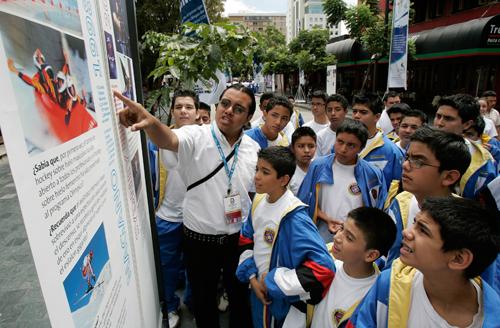IOC approves first Youth Olympics

Volunteer Fernando Kevin explain the history of the Olympic games to school children using banners along a street of Guatemala City, Thursday, July 5, 2007, as part of the extra activities of the 119th Session of the International Olympic Committee. The Associated Press
Jul 6, 2007
GUATEMALA CITY – Olympic leaders voted Thursday to create a Youth Olympics meant to drag kids from computer screens and onto the playing fields. The first is planned for summer 2010 for 3,200 athletes, ages 14-18.
It would be the first major global sports festival created by the International Olympic Committee since the advent of the Winter Games in 1924. The program was approved unanimously by a show of hands.
IOC president Jacques Rogge said the games would inspire young people around the world to take up sports. All Olympic sports would be represented, but with fewer events, and some new, youth-oriented sports might be introduced. There also would be anti-doping controls.
Details still must be worked out, but first Youth Olympics probably would be played in August 2010, and the site will be chosen in February 2008. It would have just 3,200 athletes, down from some 10,000 at the Summer Olympics, and Rogge said the smaller scope would make it possible for smaller countries to host the competition.
The initial winter games in 2012 would draw 1,000 youth athletes. That 2012 site will be picked by January 2009.
Get The Daily Illini in your inbox!
IOC executive director Gilbert Felli said each country would send at least four athletes, chosen at least 18 months in advance – which would mean selecting some at age 12.
It wasn’t clear whether the games’ format would be based on an earlier proposal that youths participate without flags or national uniforms.
Several IOC members questioned that plan Thursday, and Rogge indicated the question was open. Without national identity, “the media may lose interest and the governments may lose interest and the athletes themselves may lose interest,” said Alex Gilady of Israel.
To hold down costs, Rogge insisted the IOC would not allow any new infrastructure to be built for the event.
Even so, several IOC members said they were worried.
Rogge said the IOC could afford the cost, which he estimated at $30 million for the summer event and $15-20 million for winter.
The modern Olympic movement is associated with many other sports competitions, notably the Paralympic Games that are held in conjunction with the Olympics. But the IOC itself runs only the Summer and Winter Olympics.
Several IOC members also questioned whether the new competition would clash with existing events such as the World University Games. Felli said games held in the second half of August should avoid major conflicts. That would put the event one to two months after soccer’s enormously popular World Cup.
Still, most IOC members agreed the youth games are worth a gamble.
“Today we observe a widespread decline in physical activity and an increase in obesity” among youth, Rogge said, citing fewer physical activities in schools and the rise of the computer culture.
“Multimedia, with its elaborate graphics … is sometimes more appealing than sport.”





